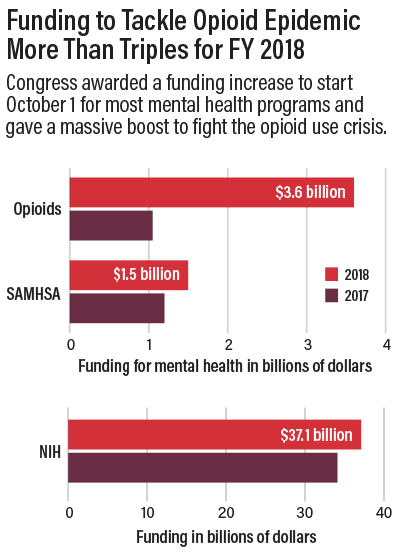Congress Funds Key Mental Health, Substance Use Programs in Budget
Abstract
The Fiscal 2018 budget boosts funding for pressing mental health and substance use issues.
APA praised Congress last month for passing the $1.3 trillion omnibus package that boosts funding for combating the opioid epidemic and for other pressing mental health issues facing the nation.

While the military was the big winner in the budget and will receive a $60 billion boost over the 2017 budget, mental health and substance use items also received significant increases, as follows:
Opioids: $3.6 billion ($2.55 billion increase from Fiscal 2017) for improving treatment and prevention efforts, finding alternative pain medications, and addressing workforce needs and behavioral health. The budget includes $1 billion for the State Targeted Response to the Opioid Crisis Grants, which awards grants to states to boost opioid prevention, treatment, and recovery activities. The funding will include a 15 percent set-aside for states with the highest opioid-related fatalities. A White House report issued last November said the opioid epidemic cost the U.S. economy more than $500 billion in 2015.
Mental health: $1.5 billion ($306 million increase from Fiscal 2017) for mental health programs at the Substance Abuse and Mental Health Services Administration (SAMHSA). Within this total, the bill provides $723 million for the Mental Health Block Grant, $100 million for new grants to Certified Community Behavioral Health Centers, and $25 million for mental health programs to address school safety.
National Institutes of Health (NIH): $37.1 billion ($3 billion increase from Fiscal 2017), including $500 million for a new initiative on opioid addiction research, development of opioid alternatives, pain management, and addiction treatment. This NIH budget boost will benefit research at its three mental health–related institutes—the National Institute of Mental Health ($110 million increase from Fiscal 2017); National Institute on Drug Abuse ($293 million increase from Fiscal 2017); and National Institute on Alcohol Abuse and Alcoholism ($26 million from Fiscal 2017).
While the omnibus provides funding for a host of pressing mental health needs, it did not include funding to stabilize the health insurance markets in the Affordable Care Act, which APA supports.
“While the funding package is not perfect, it provides a significant and meaningful boost to mental health and substance use treatment and research in this country,” said APA CEO and Medical Director Saul Levin, M.D., M.P.A. “Our members continue to pledge to work with our partners in Congress and the federal government to ensure that these funded efforts are implemented.” ■



